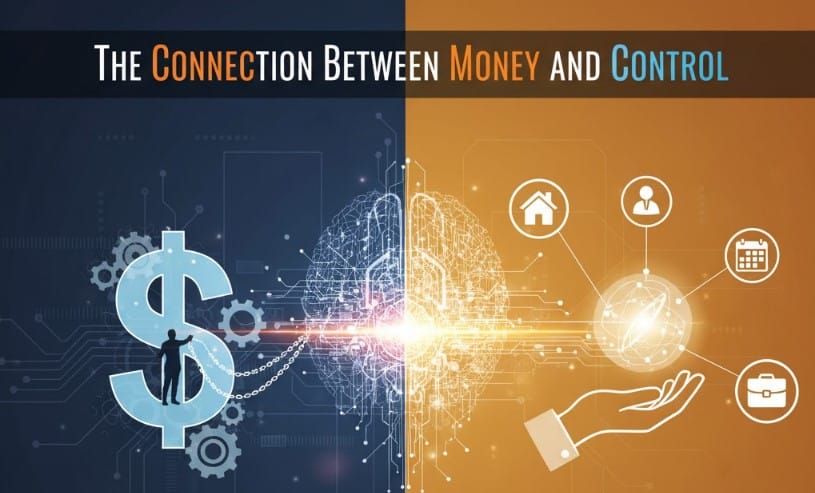Introduction
Money is more than a means of exchange — it’s a form of energy and influence.
For many people, the desire for financial stability isn’t just about comfort; it’s about control — over choices, safety, and even relationships.
When money becomes tied to control, it can either empower or ensnare us.
Too little control breeds anxiety; too much breeds rigidity and fear of loss.
Understanding the connection between money and control helps you create a healthier balance — one where money supports your freedom instead of defining it.
🧠 1. Why Control Feels So Linked to Money
Money represents options — the power to make choices, avoid risk, and feel secure.
In a world that often feels unpredictable, control over money can feel like control over life itself.
We cling to it because it symbolizes:
- Safety: “If I have enough, I’ll be okay.”
- Freedom: “I can do what I want.”
- Identity: “I’m responsible and successful.”
These beliefs aren’t inherently wrong — but when control becomes a coping mechanism for deeper fears (like insecurity or loss), money begins to take on emotional power it was never meant to have.
💬 2. The Psychology of Financial Control
Control is one of the brain’s most basic psychological needs.
It gives us a sense of predictability and agency in an uncertain world.
Money magnifies that sense because it’s tangible — you can measure it, count it, store it.
That tangibility can make financial control feel like emotional safety.
However, when this connection deepens too much, two unhealthy patterns often emerge:
🔹 The Over-Controller
Feels safest only when managing every detail — budgets, bills, and even others’ financial decisions.
Underlying fear: “If I don’t control everything, I’ll lose everything.”
🔹 The Avoider
Feels overwhelmed by money, avoids responsibility, and relinquishes control to others.
Underlying fear: “If I engage with money, I’ll feel exposed or judged.”
Both patterns stem from anxiety, not empowerment.
💔 3. How Money and Control Intersect in Relationships
Money is one of the most common sources of conflict in relationships — not because of the amount, but because of the power dynamics it represents.
Common Patterns:
- Financial Dominance: One partner uses money to make decisions or set boundaries.
- Financial Dependence: One partner relies entirely on the other for security.
- Control Through Guilt: Spending or saving decisions are weaponized emotionally.
These dynamics can erode trust and intimacy, replacing partnership with imbalance.
Healthy relationships require shared transparency and mutual respect, not secrecy or control.
(👉 Internal link idea: “How to Talk About Money Without Fear.”)
🔐 4. Control and Self-Worth: The Hidden Link
Many people equate financial success with personal worth.
When money becomes a measure of identity, control over it feels like control over self-esteem.
But this mindset is fragile — because self-worth built on money fluctuates with external circumstances.
A bad investment, job loss, or market downturn can trigger shame and anxiety, not just stress.
The key is to anchor your confidence in internal values, not external balance sheets.
Money is a reflection of your behavior, not your value as a person.
🌊 5. The Fear of Losing Control
If you’ve ever panicked about unexpected expenses, hesitated to invest, or obsessed over financial “what ifs,” you’ve experienced the fear of losing control.
This fear often masks a deeper emotional wound — from childhood scarcity, financial instability, or being taught that mistakes are unacceptable.
Signs You’re Stuck in Control Mode:
- Anxiety when spending, even on essentials
- Difficulty trusting others with financial matters
- Overanalyzing every decision
- Equating control with safety
Healing starts when you realize that true security doesn’t come from control — it comes from confidence and flexibility.
💡 6. Reframing Control Into Empowerment
You don’t have to eliminate control — just redefine it.
Healthy control means understanding your finances while allowing room for uncertainty and growth.
Steps Toward Balanced Financial Power:
- Know Your Numbers — Awareness builds confidence, not fear.
- Delegate or Share Wisely — Trust doesn’t mean loss of control; it’s partnership.
- Automate Financial Habits — Set systems for saving and investing that reduce anxiety.
- Focus on What You Can Influence — Markets shift; your response can remain steady.
- Practice Financial Mindfulness — Observe emotional triggers before reacting.
(👉 Internal link idea: “Best AI Tools for Finance & Productivity.”)
Empowerment isn’t about controlling money — it’s about building a relationship with it that feels stable, flexible, and aligned with your values.
🧘♀️ 7. Letting Go of Control Without Losing Stability
Letting go doesn’t mean neglect. It means trusting that you can adapt.
When you loosen your grip on money, you make space for creativity, intuition, and new opportunities.
Consider reframing control as stewardship — guiding your resources wisely without letting fear dictate your decisions.
Ask yourself:
“Am I managing my money from fear or from faith in my ability to handle what comes?”
That shift in mindset changes everything.
🌟 Conclusion: Freedom Over Fear
The connection between money and control is ultimately about trust — in yourself, your choices, and your ability to recover.
Money offers influence, but it shouldn’t hold power over your peace of mind.
When you stop trying to control every outcome, you gain something more valuable: freedom — the ability to live, choose, and grow with confidence.
Because real financial power isn’t about control — it’s about calm certainty in your capacity to handle whatever life brings.


